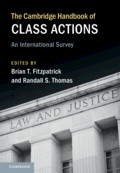Book contents
- The Cambridge International Handbook of Class Actions
- The Cambridge Handbook of Class Actions
- Copyright page
- Dedication
- Contents
- Contributors
- Foreword
- Acknowledgments
- Part I The United States
- 1 The US Class Action from a Utilitarian Perspective
- 2 Civil Rights, Access to Counsel, and Injunctive Class Actions in the United States
- 3 Class Action Nuisance Suits
- 4 How Many Class Actions Are Meritless?
- 5 The Future of Aggregate Litigation in the United States
- Part II The Americas
- Part III Europe
- Part IV Asia and the South Pacific
- Part V Middle East and Africa
3 - Class Action Nuisance Suits
Evidence from Frequent Filer Shareholder Plaintiffs
from Part I - The United States
Published online by Cambridge University Press: 29 January 2021
- The Cambridge International Handbook of Class Actions
- The Cambridge Handbook of Class Actions
- Copyright page
- Dedication
- Contents
- Contributors
- Foreword
- Acknowledgments
- Part I The United States
- 1 The US Class Action from a Utilitarian Perspective
- 2 Civil Rights, Access to Counsel, and Injunctive Class Actions in the United States
- 3 Class Action Nuisance Suits
- 4 How Many Class Actions Are Meritless?
- 5 The Future of Aggregate Litigation in the United States
- Part II The Americas
- Part III Europe
- Part IV Asia and the South Pacific
- Part V Middle East and Africa
Summary
No account of class action litigation in the United States would be complete without reckoning with its dark side − nuisance litigation. A nuisance suit is a claim filed for settlement value in spite of knowledge on both sides that the claim is weak or non-meritorious. Common indicia of nuisance suits include frequent filings, often in the form of ready-made complaints with minor factual variation, repeat-play plaintiffs, and resolutions that yield insubstantial monetary recoveries to the class but that nevertheless entitle plaintiffs’ counsel to recover fees from the defendant. On the basis of these characteristics, class action nuisance litigation is perhaps best illustrated by shareholder suits challenging corporate mergers and acquisitions (M&A) transactions.
- Type
- Chapter
- Information
- The Cambridge Handbook of Class ActionsAn International Survey, pp. 39 - 58Publisher: Cambridge University PressPrint publication year: 2021

